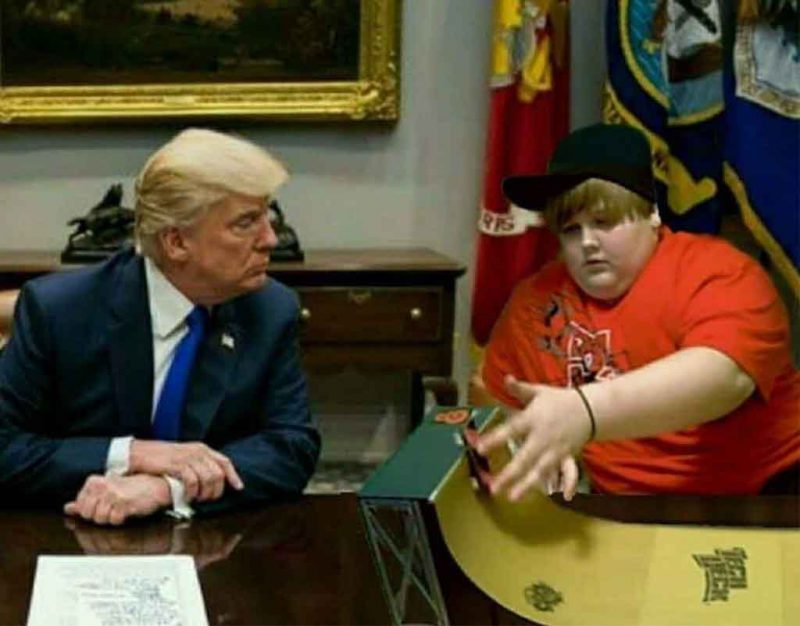America Confronts How Right Trump Was
Some years ago, we warned of the rise of the moderate extremist: apolitical voters who essentially wanted civilization to function for the long term in a realist capacity, instead of a utilitarian (opinion-based) one.
Moderate extremists want merely a functional system, but they will use any methods necessary to achieve this, since they generally have seen how the vast majority of humanity are self-deluding and pursue self-destructive ends simply because these avoid talking about difficult issues.
The Trump campaign makes two assertions: (1) that America is currently not great, but that it can be made great again. The implicit conditional there is that only if we pursue an agenda geared toward greatness will we achieve it, which logically rejects all other agendas like, say, socialism and diversity.
Despite the great media firestorm claiming that Trump was the second coming of Hitler, it turns out that Trump is a moderate who just wants to make America functional, where the “social conservatives” are invested in signaling right through radical action that Trump sees as destabilizing:
But as the Republican primary election for 2024 gathers pace, Trump finds himself eclipsed on the right by Ron DeSantis, the governor of Florida, who is betting that the party’s voters are spoiling for an even more extreme agenda.
From Covid to crime, from immigration to cultural issues, DeSantis is staking out territory that leaves the 76-year-old frontrunner fending off a once unthinkable criticism: he might be a bit too liberal.
The “social conservatives” commit one of the oldest sleight-of-hand moves, which is to speak about the half of conservatism that they support instead of endorsing the whole thing. They are OK with socialism and diversity so long as it obeys a nominal Christian and patriotic veneer.
In other words, these people are endorsing the same garbage that made the GOP odious for the last three decades, but now they have amped up abortion and anti-LGBT practices, neither of which have any relevance to making the country great or avoiding diversity and socialism.
By misdirecting the conservative base away from big issues, the GOP and DeSantis guarantee that the system will not change and therefore the Left will keep winning, but Boomer conservatives get to have one more tantrum where they can call the Democrats “racist” again.
Trump offers a more moderate option but a less symbolically satisfying one. On the other hand, everything he said would come to pass has come to pass, leading him to adopt the humble outlook of the man who has won but is waiting for everyone else to catch up:
Trump has found a strange form of humility — admitting to areas where he has no power, de-emphasizing accomplishment he used to make central to his resume, and (sometimes accidentally) copping to major errors in judgment.
Trump refused to take full credit for the actual medicine, making it sound like he helped make way for a life-saving treatment on a dare: “Everyone wanted a vaccine at that time, and I was able to do something that nobody else could have done.”
There’s saying the quiet part loud (which Trump used to excel at) and then there’s whatever that was — saying the quiet part pathetically.
No presidency escapes with zero errors, but Trump’s critics want to bash him for a few errors and ignore the big things he was right about: immigration, the Deep State, globalism, and of course the need for a national identity which is not based in politics (muh Constitution) or ideology (muh freedom).
As I wrote back when Trump started out, he is reliving the Andrew Jackson years. That is, we are seeing a rise in the power of the States to counter the federal government, and it is following MAGA realist lines rather than symbolic social conservatism, rejecting federal power:
In contrast to years past when the U.S. Chamber of Commerce drove the pro-business agenda in Washington, some House Republican leaders now prefer to meet directly with state affiliates. The Arizona and Texas state chambers of commerce have met with Speaker Kevin McCarthy of California and Majority Leader Steve Scalise of Louisiana about border security, immigration, trade and regulation.
The shift is the latest sign of how the main voice for corporate America has lost influence with Republican decision makers.
“We trust the main street chambers, the state chambers more than the U.S. chamber,” said Rep. Tom Emmer of Minnesota, the No. 3 House Republican.
In other words, the answer to the question “Can’t we all just get along?” is NO, which means that we need a weakened, smaller federal government with stronger states which can make their own decisions about drugs, socialism, diversity, abortion, and local economics.
With this vision, Trump is ahead of his time. He realizes it is as much tyranny to impose California values on Texas as to impose Texas values on California, so there is no way that strong federal power can exist. It is oppressive and therefore inefficient and economically harmful by nature.
He has always been a moderate in that he seeks to do the least amount possible with the gentlest methods possible in order to restrain federal power, defund the Deep State, and move money and decision-making back into the states.
As the various clowns like DeSantis and Pence gather at his feet, we wonder if the voters will be suicidally stupid enough to select anyone other than Trump. If they do, they will have proven that they do not deserve being made great again; they want comfortable mediocrity instead.
Tags: donald j. trump, moderate extremist, ron desantis, social conservatism










